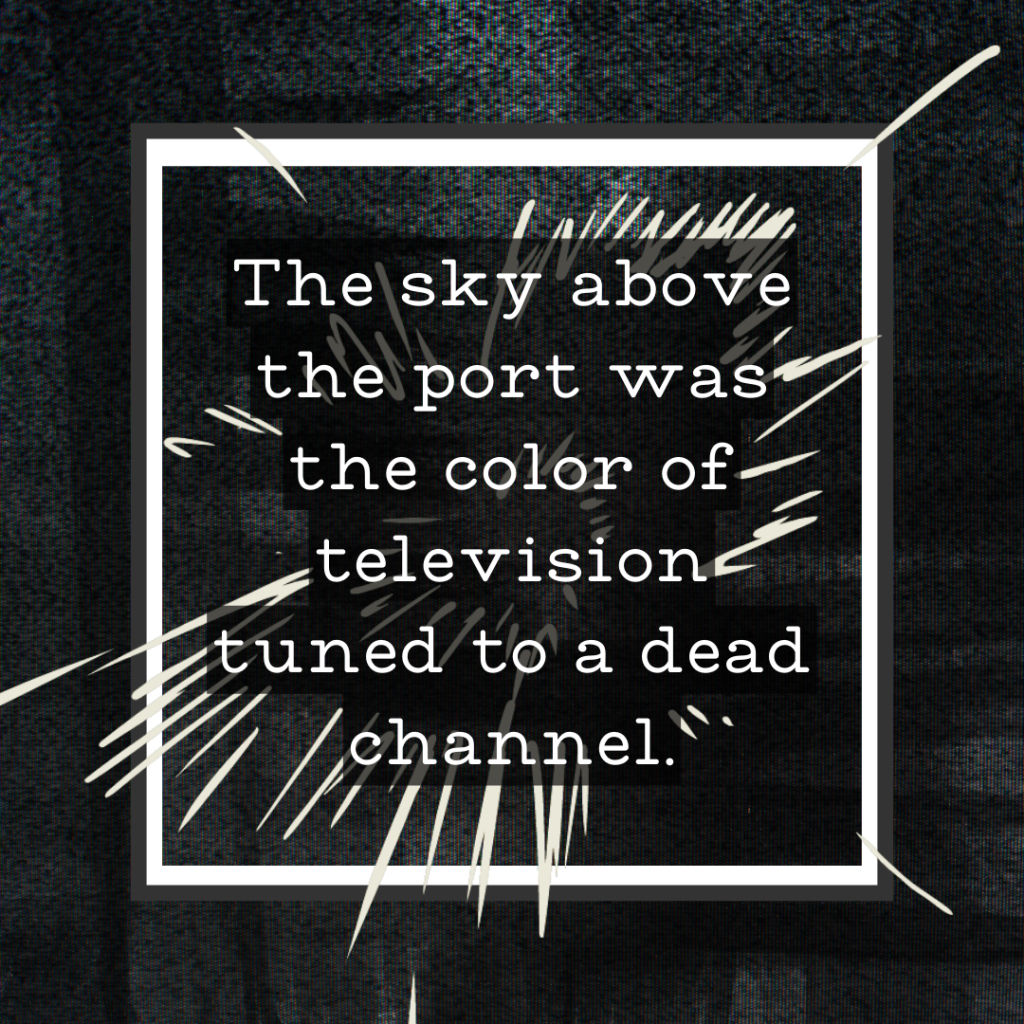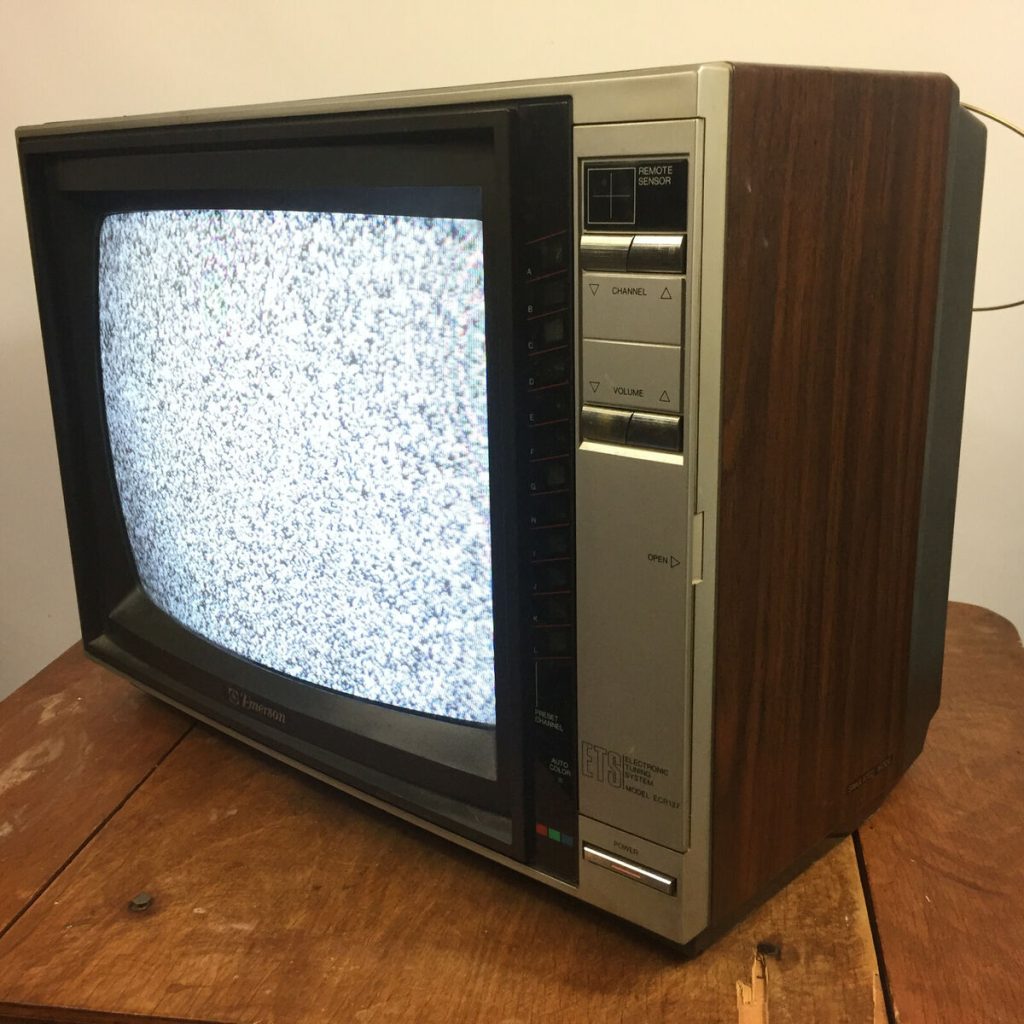Static, in motion – The formation of a man with terrible taste.
Thursday, November 28, 2024
The Outer Limits opening contains the now legendary words, “we will control the horizontal, we will control the vertical.” Like many kids, watching the scary black and white episodes through a half broken television, on a raining evening, the words were seared into my mind, along with pregnant tonal whistle which accompanied it.
This struck me as something magical as child, in the same way that the opening line of Neuromancer hit me as an adult, “The sky above the port was the color of television tuned to a dead channel.”
Both of these play with the idea of television as an allegoric representation of control. With the Outer Limits we see absolute control by a nameless, faceless, force. Meanwhile, William Gibson conjures the random, wild field of static. Offering infinite possibility awaiting form. Though, as I said when I wrote about the opening line of this book, the modern world a television tuned to static is probably a solid blue screen, for some reason. But, if I accept that here, my already stretched simile falls down like the rain falling on the sprawl in the middle of the neon glowing night.
I think the reasons which these ideas resonate so much with me is that I have always been fascinated by control, by forces which pull the fateful strings that may weave my own life. This idea has manifested over and over in my tastes, in my selections of entertainment and in my writing.
Words with a way
The first example of this I can think of, save for the Outer Limits on that old television, which sported a wooden veneer shell, which somehow fixes the memory in time an space, was the narrative spaghetti of the ‘choose your own way adventure’ genre if book, which I loved as a kid. I never had my own books, I had to explore them exclusively at the school library, which thinking back, was really a small room with a few book cases and long curtains, never the less, that was where I first learned that stories can be lies.
Flicking through one particular book I realised, that the unwritten rule of following the story, starting over with each failure, was a in fact a nefarious ruse. I was quite able to stick my thumb in one page while doing reconnaissance deeper into the book, seeing if my choices ended in death or another jump in the chessboard of chance.
This bending of the rules became outright breaking a few visits later when I learned that I could chart my path through, noting down all my choices. Fast-tracking my next adventure to avoid the endless chain of deaths felt like a miracle to me. It was only later that I discovered a new layer of complexity when the ‘fighting fantasy’ novels forced me to track my own health points and items.
The lesson I learned that day was probably the reason that I have always found cheating in video games to be a consumingly pointless endeavor. It’s the chance of loss which adds meaning to a decision. Once my choice to fight the dragon became an option, rather than a commitment, the dragon no longer cast its terrifying show across me. The enemy was a test of logic not a test of steel. Which path did the writer of the book except me to take, and which did that writer want to lead to success.
The next phase became reading the book and trying to glean the writers personality. What would they think was the coolest thing to do? could I use this to predict a safe path. Now even with cheating, I was doing battle. Learning how my adversary fought. It was only the final decision which really mattered. Was I right in my assessment of the wordsmith, or was I always to simply err on the side of awesome?
The books eventually felt like maps rather than narratives, but, a pattern was forming in my wants, even then.
Pulp Fiction fantasy
As I grew, I began developing a taste for a specific kind of fiction. Be it television, books, short stories or movies. I wanted to see the impossible be beaten. Science Fiction became my poison of choice and the things I loved, were universally the most trope steeped, Deus ex Machina fueled tripe that I could get.
I didn’t care how bad the effects were. I didn’t care how bad the acting was. I was there for the writing. And, there was a specific type of writing I was hungry for. I wanted something which let me see a little of the person behind the keyboard. Sadly, most of the stuff that my nascent brain found satisfying was commonly considered to be ‘shite.’
One film which I loved as a sixteen year old seeker of sci-fi satisfaction was the Rutger Hauer driven epic ‘Crossworlds.’ The plot of this movie was sheer pulp. At times is didn’t even make sense. The bones of it are as such…
Multiple dimensions existed along side our own. To traverse these dimension one simply needed to follow ‘paths’ between worlds. One example is that when we burst into our heroes ‘barn’ (I don’t remember, it was like an aircraft hanger, if I recall) you would find storage crates and dust. However, if you stepped between two oddly placed trees before opening the barn you would find him, in his own little pocket of reality. The movie then took this idea and added the time tested trope of a chosen-one who needed to perform menial tasks which led him to win a ten thousand year long war which had been raging between dimensions… although no one seemed to think it was that important until that moment… Also, there was a desert scene for some reason. I am likely, totally misremembering this masterwork.
The more well known movie Tron, also sated my desire for this cross reality story telling. As well as the TV show Sliders and load more movies you could probably list yourself.
I used to think I liked stories about dimensions and other worlds. But, as I said earlier in this confession, I think now that I was really just aware that stories were a patchwork of ideas, imagined places a writers tastes. These movies and shows about reality hopping heroically handsome hippies just sort of, hit me, in the soul.
As my tastes became refined further, I began to notice my own ‘narrative kinks’ and found media of higher quality to sate me. It was this thread which I realised was the reason I enjoyed anthology shows like the now repeatedly reviewed Outer Limits, the Twilight zone, and even monster of the week shows like Doctor Who was that they allowed the writers to write new and different, exciting things as and when they wanted.
As I got a little older I really go into Star Trek. At its core, its an anthology show with consistent and repeated framing devices as narrative shortcuts, to allow them to no- explain the entire of the setting every time (something Twilight zone really suffered with.)
Grant gets it
The comic-book writer Grant Morison has been telling the same story for years now. Flex Mentallo, Animal man, The invisibles and even his Final Crisis run are all examples of the exact same idea. That idea being that fiction is a place. Because of this Grant, if you don’t mind me being so informal, is doing what I love in his Deux Ex Mechanistic marvels. He is allowing fiction to be fiction. He writes himself into the story in Animal man. In Flex Mentallo he explored the nature of reality, and, in The invisibles he proposes that time is a result of will applied to narrative. He wrote a book called Zenith where he traps an entire culture in a crystal that tells a story (Something I’m certain Star Trek just stole from him to house a Sherlock Holmes themed homicidal hologram.) He nailed it for me, but most people find some of his more intense works to be nonsense. For me, the nonsense is a result of treating fiction, as, fiction and using to to explore ideas that we really can’t in real life. I know, all writers say they do this, but Grant was willing to bend the rules by shift genre and allow the reader to be as confused as his protagonists. I adore his work because of this ballsy madness.
I read a series of books called Magic 2.0 a while ago which posed that all of reality was a simulation (original, I know) and the best option once you are ‘in on it’ is to move to medieval England and pretend to be a wizard. While only tangentially related, this is, for me at least, an example of a writer using fiction to ask how life would be, if life, was a fiction.
When I set out to write my own fiction, without even realising my kink, I added these tropes to it. In my first novel, Hunters Garden, I gave my characters a place to rest, the titular Garden. The Garden passed time only when it was convenient for the narrative. Something which the characters themselves knew, though, they didn’t frame it like this. It was something akin to the proposal by CS Lewis, that the characters continue on even when the writer goes on holiday, because for them, time only passes when the writing is happening. The author is free to move around time in a way which they are not. This includes the super power of revision.
When I started on my first real series of books, Denouement, I wanted to explore the idea that reality was new, though it seemed old to those living in it. I then inserted a character who was simply observing in the same way the reader was, who was able to see the odd errors in the logic and history of their normal. This led him to declare, ‘hey, this doesn’t make any sense!’ – Where would the story go from there I mused. Three books or so later, I have my answer.
The reason I am so able to see the thread that binds my tastes is because I have intentionally spent a lot of time thinking about writing, reading and reasons. I know why I like one story and not another. I know why I like things that lots of people don’t and I know this because the muscles I developed writing have allowed me to be thorough in my self-analysis. I also truly believe that most people don’t know why they like one thing and not another. I think in part this is why a lot of people enjoy things that are narrative turds. They don’t actually know what makes a satisfying story, they just know that the story on offer is presenting in a high quality framing. In part this, I think is why crap like Knives Out, Star Wars and a great many Marvel branded offerings do so well. No one realises that they are rubbish because they are so well made.
I don’t say this because of some pretentious desire to claim I know better or can sniff out art where others cannot. Not at all. Actually I’m pretty sure I have terrible taste in media. But, I know what I like and why I like it. I have spent time thinking about it. I watch some total crap. Things I would never recommend to anyone. But, I truly enjoy this junk. I am happy with this junk. The junk defined my love of junk. I am a product of exposure to ideas that are, trope driven shite. But, I know why I like the things I do.
Do you know why you like the things you do?


